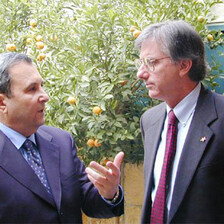The Electronic Intifada 12 November 2004
To the Editor,
The New York Times’s coverage of the death of Arafat, particularly with its November 12th Op-Ed essays, exemplifies what is so wrong with American perspectives of the Palestinian struggle for independence.
What voices are missing? Palestinian ones.
This is the recurring problem of American and European approaches to the Middle East. Arab voices are systematically undervalued, discounted, or actively suppressed — not just by their own autocrats but also by Westerners claiming to be acting “in Arabs’ best interests”, as if the Arabs were children needing a Western parent.
Westerners, proud of the rights of nationalism secured for themselves, expressly (often violently) reject them for Arabs. The most glaring example is Palestine, but we have seen it before in Iran, Egypt and elsewhere. The result has been disaster after disaster. But “experts” invariably find reasons why American or Western policy is not the cause, or even a cause.
Even in the midst of the developing disaster in Iraq, American debate, such as it is, tacitly takes the view that American policy is essentially good, or at least well-intentioned. This as the discussion also tacitly asserts that the only acceptable “democracy” is one that supports American policy. If it doesn’t endorse the American line, it isn’t democracy at all.
So perhaps we should not be surprised that the Times discounts the voices that most deserve to be heard on the death of Arafat. Instead we are told by Americans and Israelis — anyone but Palestinians — what the death of Arafat means, even what it means to Palestinians.
We are given Benny Morris, who has gone from “new historian” to supporter of genocide. “Something like a cage has to be built for them,” said Morris in an interview in Ha’aretz. There he also said, “There are cases in which the general and final good justifies difficult and cruel deeds that are carried out in the course of history.” He was speaking of the American annihilation of the Indians.
A Palestinian speaking of Israelis or Jews as Morris speaks of Palestinians would rightly be identified as anti-Semitic and would, I suspect, be ruled out as a candidate for the Times’s Op-Ed pages.
Even if Morris and those he quotes (like Dennis Ross) were right, it is extraordinary that they cannot see the hypocrisy in their failure to condemn Israeli violence (beginning with the brutal occupation itself). They make demands of the Palestinians just as they reject making the same of Israelis. They thus reject the basic prerequisite for negotiation and peace — fairness.
Jimmy Carter, with all political aspirations past, can risk criticizing Israel. He refers explicitly to the occupation, something remarkably few American journalists and politicians will do. Nevertheless, Carter tacitly repeats the mythology of the Camp David negotiations of 2000 — that Arafat rejected a good proposal. This is a myth repeated recently in the Times’s editorials, not to mention by “experts” like Thomas Friedman and Dennis Ross.
Of Clinton’s and Barak’s “offer”, we need only ask this: Would a state of the kind Clinton and Barak tried to impose on Palestinians — disjointed, permanently riddled with settlements, and drained of its most important resource to supply the occupier — be acceptable to Americans or Israelis were they faced with a like offer? The answer is a glaring no. Americans find a “direct” threat in events thousands of miles away! How would they accept a state divided and pillaged by an occupier? But this again is characteristic of an essentially hypocritical Western view.
Third, the Times gives us King Abdullah II of Jordan — a monarch. How appropriate for the pages of a paper that claims to endorse democracy. Abdullah II, king of a country with a majority Palestinian population denied representation. Is Abdullah’s inclusion a tacit Times endorsement of the “Jordan is Palestine” solution?
Finally, we should ask whether the Times, or any American news organization, would take a similar approach if Sharon were to die. Sharon — responsible for at least as many atrocities as Arafat, “architect” of the settlement policy, and recently revealed by Dov Weissglas to be opposed to real Palestinian statehood (NYT, Oct. 7), something honest observers already knew anyway.
Would we then see an Op-Ed page with no Israeli voices? Would we see Palestinians writing on the meaning of Sharon’s death? Would we see Palestinians, or even Americans, telling Israelis what to think?
Sincerely,
Hugh Sansom
Brooklyn, NY
Related Links





